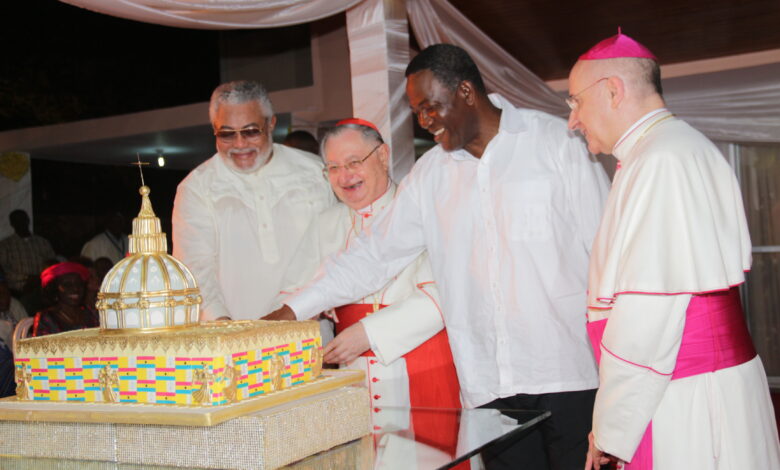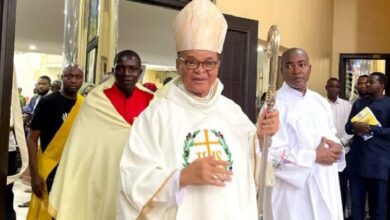Apostolic Nunciature marks Ruby Jubilee

 The Apostolic Nuncio in Ghana, Most Rev. Jean Marie Speich on Friday March 3, hosted 400 Guests including Bishops, Priests, Religious, lay faithful and Traditional Leaders, members of the Diplomatic Corps and Government functionaries, to a reception at the Apostolic Nunciature.
The Apostolic Nuncio in Ghana, Most Rev. Jean Marie Speich on Friday March 3, hosted 400 Guests including Bishops, Priests, Religious, lay faithful and Traditional Leaders, members of the Diplomatic Corps and Government functionaries, to a reception at the Apostolic Nunciature.
This was one of the major highlights organized by the Nuncio to mark the 40th Anniversary of Diplomatic Relations between Ghana and the Holy See.
Present was His Eminence Giuseppe Cardinal Bertello, President of the Governorate of the Vatican City State and President of the Pontifical Commission for the Vatican City State.
 He who was in Ghana as Pope Francis’ Special Envoy to Ghana for the 40th Anniversary of Diplomatic Relations between Ghana and the Holy See; the 60th anniversary of Ghana’s Independence on March 6.
He who was in Ghana as Pope Francis’ Special Envoy to Ghana for the 40th Anniversary of Diplomatic Relations between Ghana and the Holy See; the 60th anniversary of Ghana’s Independence on March 6.
He presided over the re-consecration of Ghana to the Sacred Heart of Jesus at an Ecumenical and Inter-faith Prayer Service at the Holy Spirit Cathedral on Saturday, March 4.
 Former President Jerry John Rawlings during, whose tenure as Head of State Cardinal Bertello served as the Third Apostolic Nuncio to Ghana, was a Special Guest at the function, with Mr. Samuel Kofi Dzamesi, Minister for Chieftaincy and Religious Affairs, representing President Nana Addo Dankwa Akufo-Addo.
Former President Jerry John Rawlings during, whose tenure as Head of State Cardinal Bertello served as the Third Apostolic Nuncio to Ghana, was a Special Guest at the function, with Mr. Samuel Kofi Dzamesi, Minister for Chieftaincy and Religious Affairs, representing President Nana Addo Dankwa Akufo-Addo.
Also present were the National Chief Imam, Sheikh Dr. Nuhu Osman Sharabutu and Papal Knights and Dames, led by their President Sir Peter Fosuaba Mensah Banahene.
Mr. Dzamesi, who led the government delegation to the reception, extended the government’s warmest congratulations to the Apostolic Nunciature for organizing the event to mark the significant milestone in bilateral relations.
He stated that the Holy See had been one of Ghana’s oldest partners in development, saying that the long standing relations between Ghana and the Catholic Church dated back to the arrival of the first Roman Catholic Missionaries on the shores of the then Gold Coast, to propagate and the subsequent establishment of the Apostolic Prefecture of the Gold Coast in 1879.
“As we commemorate 40 years of our Diplomatic Relations and the benefits of the carefully nurtured relations over the years, we hope to do more to deepen this relationship to the mutual benefit of our citizens and the people of faith,” he added.
 The Minister recalled the visit to Ghana by Pope St. John Paul II in May 1980, to celebrate the centenary of Catholicism in Ghana, as a true testament of deepening bonds of friendship and strong Episcopal relations with the Papacy.
The Minister recalled the visit to Ghana by Pope St. John Paul II in May 1980, to celebrate the centenary of Catholicism in Ghana, as a true testament of deepening bonds of friendship and strong Episcopal relations with the Papacy.
He stated that the strength of these relations was again demonstrated in the elevation of Peter Cardinal Appiah Turkson as a Cardinal in 2003 and his subsequent appointment as the first Prefect of the newly-created Dicastery for Integral Human Development in 2016 to oversee the Roma Curia and his continuous service on the Pontifical Council for Justice and Peace since 2009.
He said the appointment of Most Rev. Gabriel Anokye, Archbishop of Kumasi as the President of Caritas Africa, affirmed the Church’s interest in and love for Ghana.
Mr. Dzamesi applauded the many reforms including transparency, religious tolerance and other initiatives aimed at alleviating the plight of the poor and the vulnerable in society, which in turn had lifted the image of the Holy See in recent times.
Archbishop Jean Marie Speich outlined some works done by the Catholic Church as Member of the Ghana Conference of Religions for Peace and Member of the National Peace Council particularly in mediating conflicts in the Nkonya and Alavanyo communities, and the Kukumbas and Namumbas in the Northern Region,.

The Nuncio commended the initiatives of the Satellite Peace-Building Centre in Tamale and of the Centre for Conflict Transformation and Peace Studies at Damongo, and urged the other Embassies in Ghana to also encourage and help in that effort.
He added: “we can say that the Catholic Church in Ghana is connatural to this society. She is a wonderful part of it and a bridge builder trying to overcome human weaknesses, useless and unhealthy differences in the utopia of contributing to building up a society which is expressed in the Ghanaian motto, more just and free.”
By Damian Avevor
